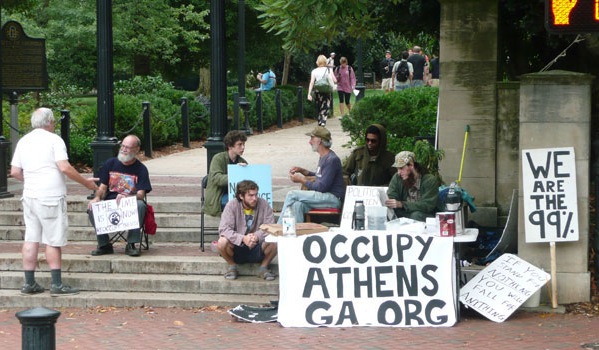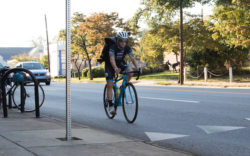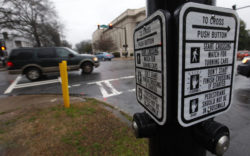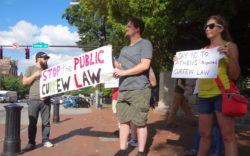Last year’s Occupy Athens protesters, who camped for four days outside City Hall and spoke or chanted out of turn during one or two commission meetings, were tame by most standards. No one was arrested, the protesters took their tents down when requested, and they never seemed to block or accost anyone. Despite that, Athens-Clarke police and commissioners apparently felt threatened enough to consider a new law to bar even such peaceful protesters from public properties like City Hall. After setting it aside last summer, the commission’s Legislative Review Committee started discussing the ordinance again last week.
It could be difficult to craft an ordinance that will allow favored activities like parade watching while barring protesters or homeless campers without the law being struck down as violating constitutional free-speech rights. County Attorney Bill Berryman offered Atlanta’s “urban camping” law, which has been copied in other Georgia cities, as a model. It defines places like City Hall as “parks,” then sets specific opening and closing hours for these new “parks.”
Because such an ordinance would effectively be closing off most public spaces at night, a list of exceptions should be added, Berryman said. Atlanta’s ordinance exempts parade-watchers, bench-sitters, sidewalk cafe patrons, “persons lying down or napping” while attending performances or festivals, people waiting for buses, people waiting for tickets, and children sleeping in strollers or baby carriages.
What, exactly, is the problem this ordinance is supposed to solve? “What we were worried about was the creeping occupation,” Assistant Police Chief Alan Brown told a group of commissioners last year. “They would creep out on the sidewalk where people would have to walk around them.” The Occupy Athens protesters might have been more concerned with creeping—or perhaps onrushing—corporate domination. In any case, they were not aggressively blocking anyone’s way.
Especially since a January fire under the North Avenue bridge threatened a gas line, officials have cited camping by homeless people as another risk. In Atlanta, some who work with the homeless have been highly critical of that city’s insistence on clearing homeless people from public spaces. But Commissioner Doug Lowry said “this stuff is in no way intended to run off homeless people,” and Commissioner Kelly Girtz said “we tend not to have a problem” with homeless people camping downtown because they prefer more secluded areas.
It would be a shame if last year’s harmless and mostly respectful Occupy protests were to frighten local government into such a headlong overreaction as to close all our public spaces at night in order to solve a problem that doesn’t really seem to exist.
“I’m throwing the idea out there,” demurred county attorney Berryman at an LRC meeting. “I don’t know how else to do it, if you want to go down that road,” Lowry added. The committee asked Berryman to research how existing ordinances might address safety issues, and it will continue its discussion next month. [John Huie]
Big Ideas: University of Georgia College of Environment of Design professor Jack Crowley is meeting with community groups and showing them maps of “big ideas” in the downtown master plan he’ll unveil later this spring. Some of the highlights include:
• a park around City Hall.
• a greenway running along Jackson Street to the Lyndon House and Lay Park.
• rebuilding the Murmur Trestle as part of the Firefly Trail from downtown Athens to Winterville to Union Point.
• a traffic circle at the Thomas Street-North Avenue intersection.
• reviving the river district with art studios and entertainment, including an amphitheater, between Foundry and Willow streets.
• a walkway between the News Building and the Classic Center connecting Thomas and Foundry streets, which were cut off when Hancock Avenue was closed for the Classic Center expansion.
• a passenger rail line not only to Atlanta, but also through the UGA campus to the Botanical Garden.
• a median and plantings along Oconee Street.
• replacing the public housing just west of campus and realigning Florida Avenue with Pulaski Street at Broad Street. (This would make up for a connection lost when part of South Hull Street was closed for the UGA Special Collections Library.)
• making Meigs Street one way going toward downtown and closing the alley near The Grit for outdoor dining.
Many of these ideas have been hanging around for awhile, but finally someone’s put them all in one place so we can see the big picture. The reaction so far: WANT. A public hearing on the draft plan is tentatively scheduled for sometime next month; we’ll let you know when an exact date is set. [Blake Aued]
The More Things Change: We recently happened across our Dec. 7, 1994 issue, which included an item by Editor Pete McCommons urging Normaltown, Boulevard and Buena Vista residents to fight medical-related development along Prince Avenue. It just goes to show that we’ve been talking in circles—gentrification related to the new UGA Health Sciences Campus was one of the main issues in the recent Buena Vista Historic District debate.
Speaking of Buena Vista, Mayor Nancy Denson allowed the historic district to take effect last week, but without her signature. She called the odds of her vetoing it “very insignificant,” but she was “still uncomfortable with the whole process.” [BA]
School Secrecy: The ACC Commission signed off on a $40 million bond issue last week for Clarke County School District ELOST-funded construction projects. It was a mere formality that was already approved by voters and the school board, and the district got a great interest rate. But as James Garland told commissioners, CCSD only gave 24 hours notice for the called school board meeting to approve the bonds, board members didn’t see the numbers until asked to vote, and some of them clearly didn’t understand what they were voting on.
The district followed the law, ACC Attorney Bill Berryman told commissioners. He also noted that brokers want to move fast to lock in favorable interest rates. But still, the public needs time to look at this stuff. It’s our money.
The commission unanimously approved the bond package with Classic City High School principal Kelly Girtz abstaining. [BA]
Like what you just read? Support Flagpole by making a donation today. Every dollar you give helps fund our ongoing mission to provide Athens with quality, independent journalism.










